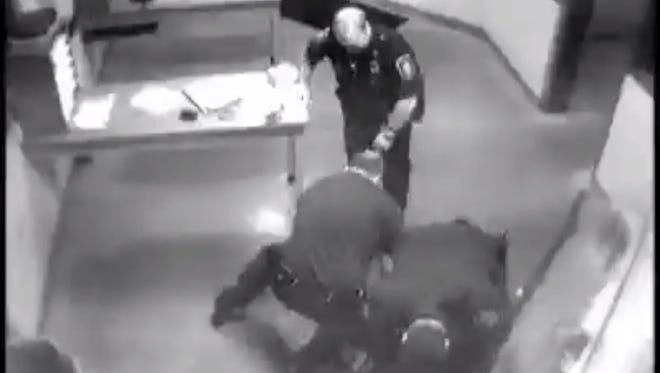$37M awarded in Mich. police beating caught on camera

DETROIT — The case started off as a drunken-driving arrest with a pat down, handcuffs, routine questions.
But things got ugly fast in the Genesee County jailhouse in Flint, Mich., that night: The suspect was allegedly beaten, dragged to the floor, had his face smashed into a cement wall and was tied down with a bag over his face.
A jailhouse camera captured it all, which didn't bode well for the officers involved.
In U.S. District Court here last week, a federal jury responded to the graphic videotape with a jaw-dropping $36.6-million verdict rarely seen in this area. The verdict not only sought to make the victim whole but sends a message to law enforcement everywhere that excessive force cannot be tolerated, lawyers said.
Grand jury to probe alleged cover-up by Chicago cops in Laquan McDonald case
"The facts must have been so hellacious, so egregious, that the jury felt compelled to send a strong message," said Detroit lawyer Joel Sklar, who was not involved in the case but who has covered hundreds of police brutality lawsuits and never received a verdict anywhere near that size.
"To get those kind of verdicts, jurors have to be so angry and so upset with the defendants that they go beyond just saying, 'I'm going to make the plaintiff whole. I'm going to let it be known to everyone that whatever happened here, this conduct will be punished by the public,' Sklar said. "And the jurors represent the public in this instance."
The case involves William Jennings, 42, of Flint Township, Mich., who sued five Genesee County sheriff's officers for alleged excessive force following a drunken-driving arrest in 2010. More than half of the verdict came in the form of punitive damages.
Defense lawyer Christopher Scott, who is part of the legal team that represented the officers, said he plans to ask the court to set aside the verdict.
"Additionally, an appeal will be undertaken, if needed, as the verdict is not supported by the law or facts," Scott said in an e-mail to the Free Press.
Scott did not elaborate. At trial and in court documents, the defense has argued that Jennings was "admittedly drunk" and "non-compliant, resistant and combative during the booking process."
On the night of his arrest, Jennings was pulled over "during an investigation that indicated" he fired a gun in a fight at a Flint bar.
"The force and maneuvers utilized were appropriate to control the situation," the defense argued in court documents.
But the other side adamantly disagreed.
"They attacked him in the jail. Then they handcuffed him and continued to assault him, smashing his face into the wall," said Dean Elliott, one of the lawyers who filed the lawsuit. "They took him into a safety cell ... covered his mouth, Tasered him and put a bag over his head and tied him down."
Elliott said he was expecting a large verdict but admits he was surprised by the nearly $37 million award.
Police violence a rising concern for Millennials, new poll shows
"I think that the jurors were sending a message to the sheriff that these kinds of actions cannot go on," Elliott said.
The case was tried before veteran U.S. District Judge Avern Cohn, who has the authority to set aside the verdict or reduce it because he finds it is excessive. The defense also could appeal to the U.S. 6th Circuit Court of Appeals, which could decide the award is excessive.
While large verdicts in civil cases are often challenged, there's no reason to believe that this one won't stick just because of its size, said Bill Swor, a prominent Detroit defense lawyer not involved in the case.
How Michael Brown's death, two years ago, pushed #BlackLivesMatter into a movement
"There's no question that the judge will take a hard look at this verdict," Swor said. "I suspect the judge may look at the conduct, review the evidence to see whether the jury was being a renegade jury or whether the jury was outraged."
Given the times and the public outrage over excessive police force, Swor said the jury likely was sending a message.
"The jury must have had a reason for picking that number. What may appear to the average person to be an extraordinary verdict may in the jury's eyes be entirely justified," he said. "People are sensitive to this."
'Hate cops?' billboard prompts controversy in Indiana
Across the country, verdicts in police-brutality lawsuits range from tens of thousands of dollars to tens of millions of dollars.
On the higher end, a jury in Chicago awarded a $28 million verdict in a 1999 police brutality case that involved two police officers who beat a man into a coma who also became paralyzed.
In 1992, the City of Detroit paid $5.2 million to the family of Malice Green,an African-American man whose beating death at the hands of two white police officers triggered a firestorm of controversy. Green was beaten in the head with a flashlight after refusing to open his hand and allegedly relinquish a vial of crack cocaine. The two officers, Walter Budzyn and Larry Nevers, were convicted in his death.
Follow Tresa Baldas on Twitter: @Tbaldas